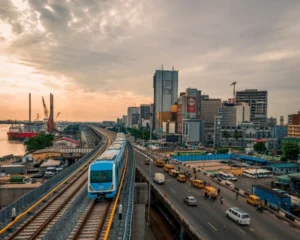Lagos Is Dirty, But These Streets Are in a League of Their Own
Lagos is the economic capital of Nigeria, but some parts of it look like scenes from a post-apocalyptic movie. While the Lagos State Government keeps talking about “Keep Lagos Clean”, some streets across the city are still drowning in mountains of refuse, overflowing gutters, and stinking drainage systems.
We dug deep — and sniffed hard — to compile the top 10 dirtiest streets in Lagos based on environmental reports, local complaints, viral videos, and real-life observations. Eyes Of Lagos reports,

🧼 Top 10 Most Disgustingly Dirty Streets in Lagos (2025 Edition)
1. Oshodi-Apapa Expressway (Berger to Mile 2 Axis)
-
Why it made the list: Permanent dumpsite vibes.
-
What’s happening: Endless traffic meets trash dumps. Traders dump refuse directly on the road. The gutters? Blacker than night.
-
Street Smell Score: 9.5/10 🤢
2. Idumota Market Street (Lagos Island)
-
Why it made the list: Pile of garbage meets human traffic.
-
The Reality: Traders operate literally on waste. You can’t dodge the stench — it comes in waves like sea breeze, but evil.
-
Bonus: The gutters here haven’t seen daylight in years.
3. Ajegunle Boundary Road (Ajeromi-Ifelodun)
-
Why it’s here: No drainage, no waste control.
-
Shocker: Flooding + uncollected trash = swampy cocktail of disease.
-
Street Report: Even mosquitoes wear nose masks here.
4. Ijora-Badia Road
-
Why it’s filthy: Overflowing refuse dumps are now local landmarks.
-
Local Quote: “Na here we dey dump, na here we dey shop.”
-
Danger Level: High – open defecation, needles, dead rats… you name it.
5. Iyana-Ipaja Under Bridge
-
What’s wrong: Illegal markets, blocked drains, street food next to dumps.
-
Special Feature: Gutter juice floods the road during light rain.
-
Shocking Truth: Street cleaners allegedly avoid this area.
6. Okokomaiko Bus Stop Vicinity
-
Why it’s nasty: Refuse collection? Never heard of it.
-
On the ground: Molue buses pass trash heaps like it’s nothing.
-
Observation: Children play in pools of black water. No jokes.
7. Ladipo Spare Parts Market (Mushin)
-
Why it’s on this list: Grease, oil, waste – perfect storm.
-
Market Life: Mechanics work right beside clogged drains and oil spills.
-
Extra: Don’t wear white clothes here unless you’re done with them.
8. Otto Market, Oyingbo
-
Why it’s dirty: Flooding + dumped waste = chaotic hygiene.
-
Reality Check: Perishable foods sit next to decomposing trash.
-
Quote from vendor: “We clean small, but LASG no dey do their part.”
9. Ajah Under Bridge Area
-
Dirty Secret: Trash builds up faster than it’s cleared.
-
Problem: Street vendors, commuters, and beggars use drains as toilets.
-
Viral Moment: A video recently showed a goat eating from a blocked canal.
10. Alaba Rago Market Road (Ojo)
-
Why it’s terrifying: Animal waste + human waste + general filth.
-
What locals say: “This place get smell wey pass sense.”
-
Risk Alert: High cholera potential during rainy season.
🚨 Why Are These Streets Still This Dirty in 2025?
Despite billions allocated to LAWMA and Lagos State Ministry of Environment, most of these streets have no effective waste management. Worse, many residents and traders openly dump trash, believing it’s “the government’s job” to clean up.
The truth? Cleanliness in Lagos is everyone’s responsibility. Until there’s proper education, enforcement, and daily cleanup culture, these streets may remain environmental hazards.
🤬 Social Media Reacts
-
@LagosBoyTee: “Idumota smells like hot dustbin water every morning. Can’t believe people eat here.”
-
@TrashTalkNaija: “Lagos needs less press conferences and more sweepers. Go to Ijora-Badia and you’ll cry.”
-
@MissWahala: “If you survive a week in Ajegunle without malaria, you deserve a national honour.”
💡 Eyes of Lagos Recommends:
-
Stricter sanitation laws with local enforcement
-
Daily street-level cleanup teams
-
Public toilets and waste bins at markets and bus stops
-
Environmental education campaigns in dirty zones







